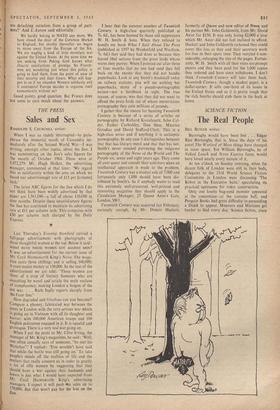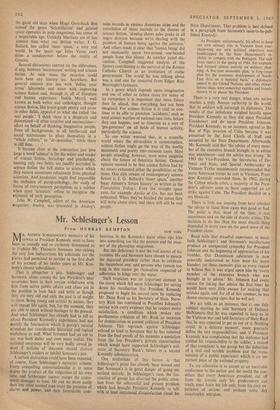SCIENCE FICTION
The Real _People
BILL BUTLER writes:
Burroughs would have been lost . . . Edgar Rice Burroughs, that is. Since the days of his novel The Warlord of Mars things have changed in outer space. Yet William Burroughs, he of Naked Lunch and Nova Express fame, would have loved nearly every minute of it.
At ten o'clock on Sunday morning, when the decent folk of London were still in their beds, delegates to the 23rd World Science Fiction Convention in London were discussing The Robot in the Executive Suite,' speculating on practical optimums for robot construction.
Only one lonely bug-eyed monster appeared at the convention—at the costume ball; and Penguin Books had great difficulty in persuading a Dalek to appear. Monsters and Martians get harder to find every day. Science fiction, since
the good, old days when Hugo Gernsback first named the genre `Scientifiction' and printed space operatics in pulp magazines, has come of a respectable age. Unlikely Martians are of less interest than what one British writer, J. G. Ballard, has called 'inner space,' a very real world. In the space age Jules Verne can't shine a candlepower before the reality of Gemini.
Several discussions centred on the differences, if any, between 'mainstream' writing and science fiction. At such times the occasion could have been any literary tea. Anywhere. But general concern was less with 'define your terms' labyrinths and more with improving science fiction and, through it, all of literature and human experience. Judith Merril, well known as both writer and anthologist, thought science fiction, like avant-garde poetry and prose in other fields, appealed to what she called 'the real people.' I think there is a desperate and determined—if often intuitive and unconscious— effort on behalf of thinking, imaginative people, from all backgrounds, in all intellectual and social microcosms to place themselves in a "whole culture," to "de-specialise," while there is still time. . .
It became clear at the convention just how large a word 'science' is for the writer and reader of science fiction. Sociology and psychology, naming only two fields, are readily accorded in science fiction the full status as science which they receive sometimes reluctantly from physical scientists. And academies might find impossible the inclusion of parapsychology, the study of forms of extra-sensory perception, as a science when most 'scientists' refuse to recognise the existence of such perception.
John W. Campbell, editor of the American magazine, Analog, was interested in Analog's sales records in various American cities and the correlation of those records to the themes of science fiction. 'Analog shows sales peaks in all negro districts because we're dealing with the problem of human being against the universe.' And others made it clear that 'hutnan being' did not necessarily mean two-armed, one-headed people from this planet. At another panel dis- cussion, Campbell suggested analysis of the factors contributing to the survival of the Roman Catholic Church as an institution of stable government. The world he was talking about was a real one far removed from Edgar Rice Burroughs's fantasies.
In a genre which depends upon imagination and use of other or future times for many of its viewpoints it is important that more future does lie ahead, that everything has not been imagined. For science fiction it is vital to con- tinue to be able to postulate 'accidents,' such as total atomic warfare or national race riots, before they can happen, and so function as a sort of 'pre-governor' on all fields of human activity, particularly the science.
So one writer worried that, in a scientific world where the miraculous is commonplace, science fiction might go the way of the woolly mammoth and poetry into museum cases. Most people attending, however, were more sanguine about the future of futuristic fiction. General opinion seemed to be that science fiction had by no means exhausted either the possibilities or the times. One rich stream of contemporary science fiction is J. G. Ballard's 'inner space,' another Isaac Asimov's 'future history' as written in the nundation Trilogy. Even the straight space yarn, for example Apollo at Go, has not been exhausted. When they've finished the moon they will write about stars; and there will still be real people.































 Previous page
Previous page